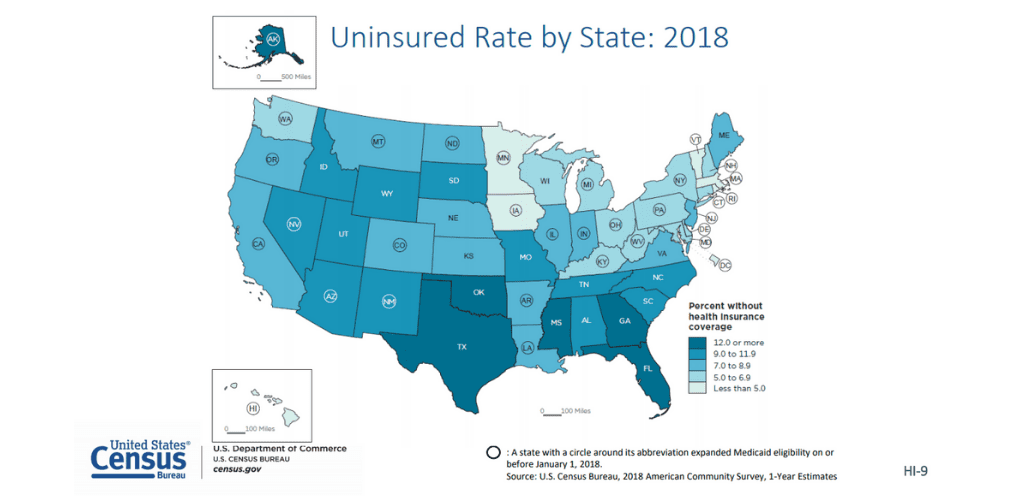The U.S. Census data released the latest numbers of Americans without health insurance today, and as earlier polls predicted: both the number and percentage of Texans without health coverage got worse for the second year in a row. New U.S. Census data shows the number of uninsured Texans in 2018 was 5 million—186,000 more than in 2017. Texas enjoyed three straight years of historic improvements in our uninsured rates from 2014 to 2016, but lost ground in 2017 and 2018, leaving 17.7 percent of Texans uninsured, the worst Texas rate since 2014.
With two consecutive years of setbacks in 2017 and 2018, Texas remains the state with both the largest number and percentage of uninsured residents in the United States. Inaction by the state leadership and legislature is responsible for Texas’ extreme ranking, while federal actions have also directly undermined coverage across the nation.
One obstacle to Texans demanding real solutions: 2018 polls found that most Texans don’t know the uninsured rate in Texas is higher than other states—let alone that we have been ranked worst for many years. Just over one-third (34 percent) knew that Texas’ uninsured rate is higher than other states (in fact, it is highest in the U.S.). Another 19 percent of those polled thought Texas’ uninsured rate was about the same as other states, and 16 percent thought it was actually lower than most other states.

While the September 10 data release announced a significant increase in uninsured children nationwide, the Census did not release detailed state-specific uninsured statistics for children (or other age groups); those will be provided on September 26, 2019—stay tuned for an update then, with a special focus on children!
Solutions for Texas Adults
Texas has the most limited Medicaid coverage of adults in the nation. Just under one third (about 1.5 million out of 5 million) of uninsured Texans are adults who would gain health coverage if Texas finally accepted an estimated $8-$10 billion a year in federal funds and offered that coverage. States like Texas without any form of Medicaid expansion have no subsidized coverage for working-poor adults because the Affordable Care Act (ACA, or Obamacare) subsidies are only available above the poverty line. The Census report calls attention to the concentration of high uninsured rates among the 14 states that have not yet provided Medicaid to parents and other low-income adults. Much lower uninsured rates in the 34 states with various models of Medicaid expansion also underscore what a powerful tool that policy would be to help cure Texas’ last-place uninsured ranking.
Texas adults with low and moderate incomes also need help from Congress to make commercial insurance affordable for families with incomes above the ACA subsidy income limits. A range of policies of the Trump administration have increased their premiums and deductibles, and also made it harder to enroll in coverage.

Texans Want Action from the Legislature
In 2019 polling, 91 percent of Texans said the state should play a role in a functioning health care system. Similarly, 82 percent of Texans said that the federal government has a similar role in the health care system, and 88 percent say they think health insurance companies should be required to provide coverage for people with pre-existing medical conditions. And, more than half (54%) of Texans say the state should increase spending on health care—only spending on public education (69%) ranks higher.
The state legislature and governor can do better by accepting billions in federal funds to cover working poor adults, and taking steps to stabilize our state insurance markets. Congress can reverse destructive federal policies that are driving down insurance coverage for middle-income Americans, and causing hundreds of thousands of U.S. citizen children to forego health care they deserve. Political pressure fuels action, so Texans who want to see Austin and Washington’s lawmakers do more will need to demand change to reduce the number of uninsured Texans!
Background: Today’s data from the Census Bureau’s American Community Survey—with a massive sample size of about 3.5 million people across the U.S.—confirm with a much higher degree of accuracy what earlier, smaller-sized surveys had predicted. For more information or to schedule an interview with a CPPP expert please contact Oliver Bernstein at bernstein@cppp.org.
Stay tuned as on September 26 the Census Bureau will release more American Community Survey data, including Texas-specific details on the uninsured, and data about poverty and income. To better understand the difference between the two American Community Survey (ACS) and the Current Population Survey (CPS), view our side-by-side comparison.
